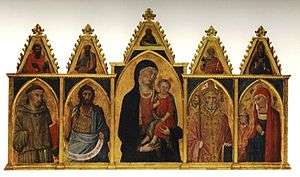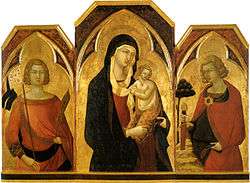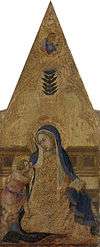Bartolomeo Bulgarini
| Bartolomeo Bulgarini | |
|---|---|
| Born | 1300-1310 |
| Died | 1378 |
| Nationality | Italian |
| Occupation | Painter |
Bartolomeo Bulgarini (1300-1310 – 1378), also known as Bulgarino or Bologhini,[1] was an Italian painter of the Trecento period in Siena both before and after the Black Death.[2]
Early life
Born into a noble family with several members being elected into the Commune, Siena’s central governing body, several times.[3] He is firmly in the Sienese school of painting using a byzantine-esque figuration and traditional gold leaf aesthetic of Sienese painting. With his contemporaries, Simone Martini, Pietro Lorenzetti and Ambrogio Lorenzetti and others he is part of the generations following Duccio. He was the only painter of his generation to be mentioned by Giorgio Vasari.[3]
History

Bulgarini’s oeuvre has seen much controversy in its reconstructions with works formerly attributed to Ugolino Lorenzetti, a composite name constructed by Bernard Berenson referencing the stylistic similarities to Ugolino Da Niero and Pietro Lorenzetti[2] which he attached to a small body of nine paintings believed, to all be by the same unknown Sienese artist. The paintings were grouped on a similar visual fluency, style and formula demonstrating a distinctly “Ugolini-esque” aesthetic.[4] However, of those nine paintings six were later attributed to "The master of the Ovile Madonna" by Ernst Dewald on the grounds of a perceived fundamental stylistic difference he claimed separated the paintings.[4] It wasn’t until Millard Meiss made the argument that the works attributed to both "The master of the Ovile Madonna" and "Ugolino Lorenzetti" might actually be by the same artist, Bulgarini.[4] Much of the difficulty in constructing his oeuvre is due to the lack of documentation needed to establish the Painters authorship and timeline of his work. The only known autographed work by Bulgarini is the St. Victor altarpiece in Siena Cathedral.[3] It was not until much later when several documents were found and the St Victor Altarpiece was reconstructed that we are able to have a clearer picture of his artistic career.[3]
The St. Victor Altarpiece
This altarpiece (1348–1350),[5] found in the Siena Cathedral, was one of four altarpieces commissioned by the Commune, that depict the four patrons saints of the city. The other three altarpieces: St Ansanus by Simone Martini, St Crescentious by Ambrogio Lorenzetti and St Savinus by Pietro Lorenzetti; were identified earlier because the panels were signed and dated, and because of 15th century inventories from the cathedral.[6] However, none of these sources were consistent in mentioning the St Victor Altarpiece. It wasn’t until the late 16th century that previously lost inventories, made by Guigurta Tommasi, named Bulgarini as the painter of the St Victor altarpiece.[6]
Career
The earliest mention of Bulgarini is in 1338 for a payment made for a Biccherna book cover; books containing the financial transactions for the Commune starting in the thirteenth century until the fifteenth century. In 1341 and 1342 he was commissioned for two more covers for consecutive seasons.[3] His career, starting roughly in the 1330s, lasted into the 1370s.[2] His last documented work supposedly signed and dated 1373, which is now lost was a panel painting for the hospital of Santa Maria Della Scala in Siena.[1] Though he was active up until his death in 1378.
The Assumption of the Virgin and Doubting Thomas Altarpiece
The Assumption of the Virgin with Doubting Thomas (early 1360s)[3] is a large panel painted by Bulgarini. It was part of an altarpiece for the chapel which housed a group of important relics acquired by the Santa Maria della Scala Hospital from Constantinople, which included the Virgin’s belt or girdle that she cast down to Thomas.[7] The importance of the relics is reflected in the composition of the panel painted by Bulgarini. Bulgarini’s somewhat unusual portrayal of Thomas with his back to the viewer differs from other iconography of the period, perhaps representing the position of the parishioners and Sienese officiants in worship of the virgin and the recently acquired relics in the newly constructed chapel.[7]
Works
Works attributed to Bulgarini are found at the Isabella Stewart Gardner Art Museum in Boston; the Fogg Art Museum in Cambridge; the Städel Art Museum in Frankfurt (Blinding of St Victor); and the Wallraf Richartz Art Museum in Cologne (Enthroned Madonna and Child).
 Berenson Polyptych (1340s) Villa I Tatti, Florence. |
 Madonna and child and Saints (c. 1335) Pinacoteca Nazionale, Siena |
 Madonna van de nederigheid |
References
- 1 2 Miklós Boskovits; Serena Padovani (1990). Early Italian painting: 1290-1470. Sotheby's Publications. ISBN 978-0-85667-381-8. Retrieved 17 May 2012.
- 1 2 3 Dobrynin, Laura (2006). "Bulgarini, Saint Francis, and the Beginning of a Tradition". MA Thesis. OhIo University.
- 1 2 3 4 5 6 Judith Steinhoff-Morrison (1990). Bartolomeo Bulgarini and Sienese painting of the mid-fourteenth century. Princeton University. Retrieved 17 May 2012.
- 1 2 3 Meiss, Millard (1931). "Ugolino Lorenzetti". The Art Bulletin. 13 (3): 376–397. doi:10.2307/3050804. JSTOR 3050804. Retrieved 2012-05-17.
- ↑ Steinhoff-Morrison, Judith “Bartolomeo Bulgarini and Sienese Painting of the Mid-Fourteenth century” PhD dissertation, Princeton University, 1990.
- 1 2 Beatson, Elizabeth H.; Norman E. Muller; Judith B. Steinhoff (1986). "The St. Victor Altarpiece in Siena Cathedral: A Reconstruction". The Art Bulletin. 68 (4): 610–631. doi:10.2307/3051044. JSTOR 3051044. Retrieved 2012-05-17.
- 1 2 McClannan, Anne (2007). Fleming, K.E.; Adnan A. Husain, eds. A Faithful Sea: The ReligiSous Cultures of The Mediterranean, 1200-1700. Oxford: Oneworld. ISBN 978-1851684960.
Further reading
- Boskovitz, Miklos, ed. The Alana Collection: Italian Paintings from the 13th to 15th century. Firenze: Edizioni Polistampa, 2009.
- Meiss, Millard. "Ugolino Lorenzetti". The Art Bulletin, Vol. 13, No. 3 (1931), pp. 376–397. Accessed: 06/04/2012 18:05. http://www.jstor.org/stable/3050804
- McClannan, Anne. “Bulgarini’s Assumption with Doubting Thomas: Art, Trade, and Faith in Post-Plague Siena”. Fleming, K.E., Adnan A. Husain ed. A Faithful Sea: The Religious Cultures of The Mediterranean, 1200-1700. Oxford: Oneworld, 2007. ISBN 978-1851684960
- Pope-Hennessy, John & Kanter, Laurence B. (1987). The Robert Lehman Collection I, Italian Paintings. New York, Princeton: The Metropolitan Museum of Art in association with Princeton University Press. ISBN 0870994794. (see index; plate 7)
- Steinhoff, Judith B. 2007. Sienese painting after the Black Death: artistic pluralism, politics, and the new art market. Cambridge: Cambridge University Press.